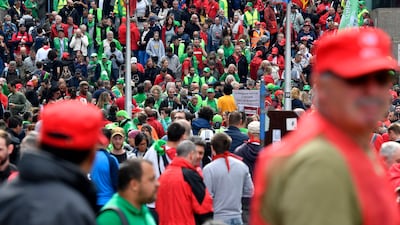Widespread disruption at Brussels Airport halted all outbound flights on Monday amid industrial action from public and private sector workers in Belgium.
At least 70,000 striking workers and demonstrators took to the streets of Brussels, in a row over pay and the cost of living.
Protesters carried flags and banners reading "More respect, higher wages" and "End excise duty", while some set off flares.
There was also flight disruption at UK airports caused by staff shortages and equipment failure, while the UK is set to be crippled by industrial action on Tuesday.
The Belgian protest, organised by the ACV, ACLVB and ABVV trade union federations, heralds the start of a week of industrial action across Belgium.
The unions want political leaders to do more to address the cost-of-living crisis and to reform legislation to allow easier salary negotiations.
The Belgian capital came to a near standstill because of the national strike, with airports and public transport networks worst affected.
Flemish public transport operator De Lijn warned trams and buses would be affected by worker absences and route closures.
Management at Brussels Airport warned of queues of up to eight hours at security screening after a walkout by G4S security staff.
The company advised passengers not to come to the airport and to rebook their flight “if possible”.

Most scheduled flights on Monday, including all outbound flight, were cancelled. Brussels Airport said it could not allow passenger flights because of the security walkout.
Management at Brussels South Charleroi Airport, a hub for low-cost airlines such as Ryanair, urged passengers to arrive at least three hours before departure, amid disruption concerns.
Some of Europe's busiest airports have been affected by staff shortages and logistical issues in recent weeks.
Cleaning staff at Amsterdam's Schiphol Aiport went on strike on Monday after they were not part of a 5.25 euros per hour pay bonus given to 15,000 other workers at the airport.
Heathrow on Monday asked airlines to cut 10 per cent of flights at two terminals on Monday, while easyJet has started cancelling thousands of flights.
The move by Heathrow affected around 5,000 passengers at Terminals 2 and 3 on approximately 30 flights.
An Emirates Airbus A380 with almost 500 passengers to Dubai was one of the flights that were grounded.
Other cancellations included at least three Virgin Atlantic transatlantic flights, two of them to New York and Los Angeles.
British Airways said it had cancelled flights to France, including three destined for Toulouse and two for Marseille.
It comes after images emerged on Friday of a huge pile-up of passengers’ luggage at Heathrow. It has been blamed on technical problems.
Heathrow “apologised unreservedly” in a statement for the disruption faced by passengers at the weekend.
Meanwhile, Britain is bracing itself for three one-day strikes on its railways starting on Tuesday.
The strikes by the Rail, Maritime and Transport union are likely to severely disrupt services on the railways and London Underground, with increased traffic expected to choke roads during the summer.
Heathrow said the action would hit Heathrow Express and Piccadilly line services to and from the airport on Tuesday.
Belgian unions representing cabin crew of Ryanair say they plan a strike from June 24 to June 26, during a peak holiday weekend and an EU summit in Brussels on June 23 and June 24.
Unions at flag carrier Brussels Airlines plan to go on strike at around the same period.
The ACV and BBTK unions say Ryanair is not respecting Belgian labour law, which covers such issues as the minimum wage and cabin crew payments.
Inflation hit 9 per cent in June in Belgium, largely because Russia's invasion of Ukraine has hit grain supply and caused the cost of energy to rise.
Prime Minister Alexander De Croo said Belgian workers were better protected than those in most EU countries because wages were indexed to inflation.
He told public broadcaster RTBF the government had extended sales tax breaks on gas, electricity and fuel until the end of the year.










